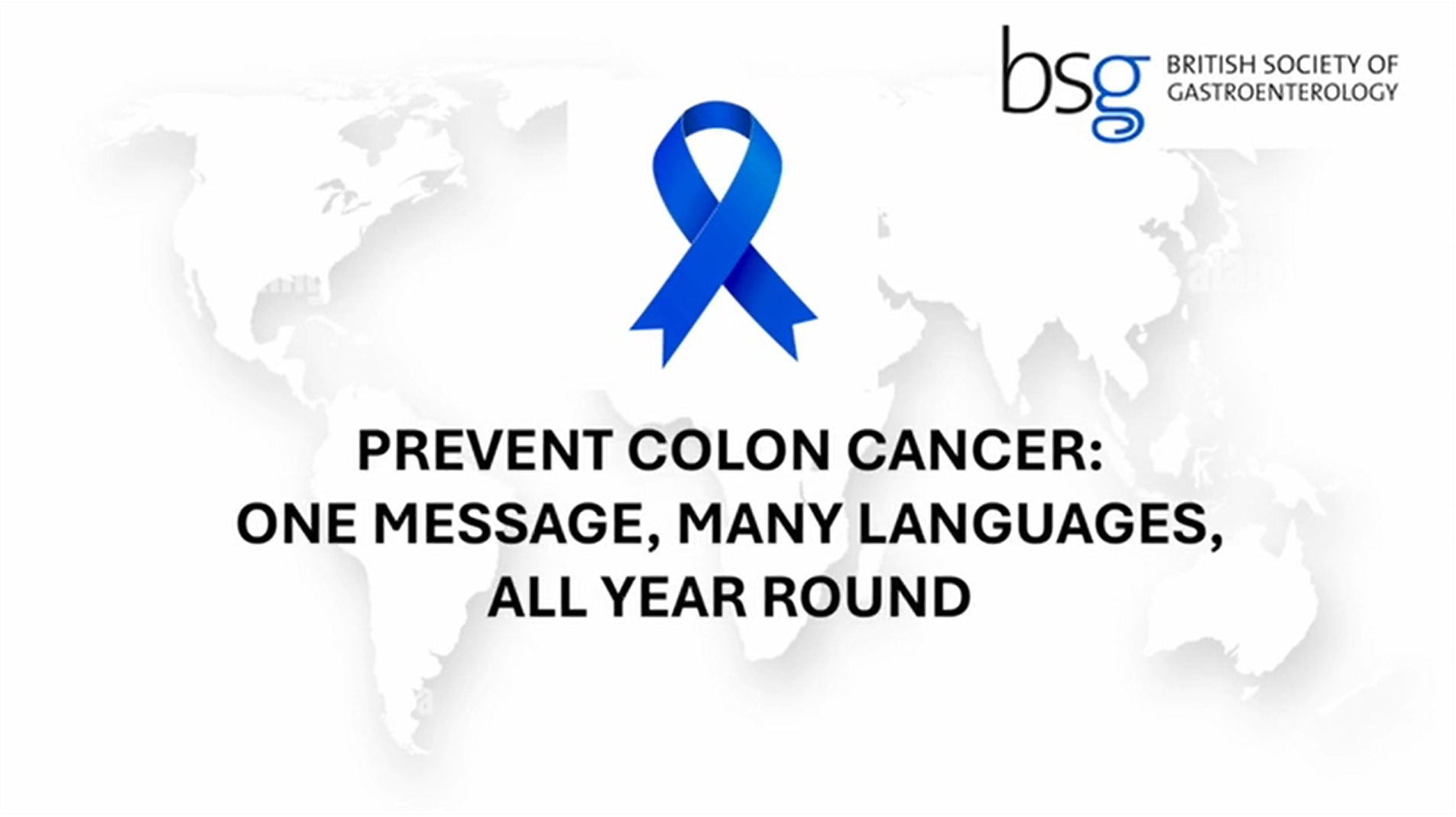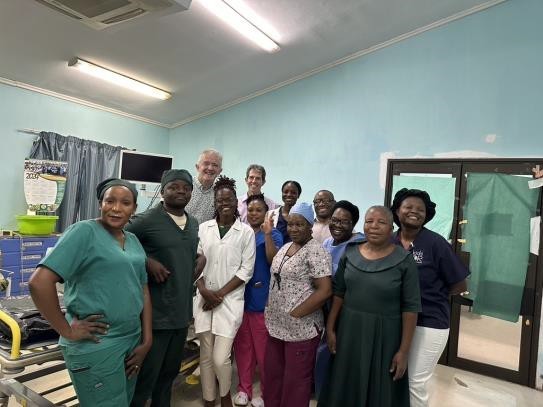
International Committee Project: Development and implementation of an Endoscopy Reporting System (ERS) for Smaller Endoscopy Services in Africa (Zambia and Nigeria)
EndoReportingApp®: A collaboration project funded by BSG led by Dr Nimzing Ladep, member of the British Society of Gastroenterology (BSG); Consultant in Hepatology, IT & Audit Lead, Gastroenterologist, Norfolk and Norwich University Hospital, Norwich, United Kingdom.
Dr Nimzing Ladep identified that smaller endoscopy services in Africa often encounter significant challenges in accessing Endoscopy Reporting Systems (ERS). These challenges hinder their ability to standardize data reporting and develop comprehensive databases crucial for clinical audits and quality improvement. The limited availability of advanced digital health infrastructure, combined with insufficient technical support, funding, and training resources, makes it difficult for these facilities to implement sophisticated ERS solutions, which are more readily available in high-income countries.
Inconsistent data collection methods across various centres further complicate efforts to perform accurate clinical audits and monitor patient outcomes effectively. This lack of standardized reporting impedes research and the enhancement of endoscopy services across the region. Addressing these issues requires tailored solutions that consider local constraints, including the provision of simpler, cost-effective ERS options and targeted training programs to build capacity among healthcare professionals.
A pilot project in Sierra Leone, which involved testing a web-based ERS, provided valuable insights into user operability in low- and middle-income countries (LMICs). Dr Ladep gained a better understanding of key requirements for ERS advancements and identified potential enhancements tailored to the needs of smaller endoscopy services in Africa.
In response, the BSG has agreed to collaborate on developing an endoscopy reporting software to address these challenges. A survey was conducted to screen LMIC hospitals in Africa to identify those eligible for participation in this collaborative project. The survey assessed the suitability of these hospitals based on several criteria, including the presence of a functional endoscopy unit, the state of their current IT infrastructure, and any existing reporting software.
Our primary goal was to understand the specific challenges these hospitals face in their endoscopy reporting processes and to identify areas that could benefit from improvement. By evaluating the current capabilities and limitations of the endoscopy units, the survey helped pinpoint technical difficulties and determine the specific requirements and integrations needed from the ERS. This information is crucial for tailoring the system to meet the unique needs of each hospital and ensuring successful implementation.
Another key aspect of the survey was to gauge the willingness of these hospitals to collaborate with the British Society of Gastroenterology (BSG). The partnership involves not only adopting the ERS but also providing valuable insights and feedback to refine the software further. Hospitals were asked to commit to conducting a minimum of 100 esophagogastroduodenoscopy (OGD) and/or colonoscopy procedures within a three-month period. This commitment is essential for the practical evaluation of the software’s performance and effectiveness in a real-world setting.
Additionally, we sought to clarify the level of support and training that each hospital expects during the implementation and post-implementation phases. Understanding these expectations allowed the project team to provide the necessary resources and guidance, ensuring that hospital staff are adequately prepared to use the new system. This approach aims to facilitate a smooth transition and maximize the benefits of the ERS in improving the quality and standardization of endoscopy reporting across the participating hospitals.
Out of the five hospitals that initially expressed interest, three responded to the survey by the deadline. Further questions were sent to refine the selection process, and ultimately, University College Hospital in Ibadan, Nigeria, and Levy Mwanawasa University Teaching Hospital in Lusaka, Zambia, met all necessary criteria. A meeting was scheduled with the project team based in Norfolk and Norwich to discuss the commencement of the initiative. Formal invitations were then sent to the participating hospitals, outlining the 12-month timeline, implementation plan, execution phases, and projected outcomes of the collaboration.
 The implementation of the EndoReportingApp® in Nigeria was conducted from 26th March to 2nd April 2024, beginning with a successful deployment at the University College Hospital in Ibadan. Dr Ladep led the on-site implementation, with virtual support provided by Mel MacCallum, Endoscopy Sister and Nurse Lead on the International Committee of British Society of Gastroenterology (BSG). This collaborative approach ensured a structured training process and set a strong foundation for subsequent efforts.
The implementation of the EndoReportingApp® in Nigeria was conducted from 26th March to 2nd April 2024, beginning with a successful deployment at the University College Hospital in Ibadan. Dr Ladep led the on-site implementation, with virtual support provided by Mel MacCallum, Endoscopy Sister and Nurse Lead on the International Committee of British Society of Gastroenterology (BSG). This collaborative approach ensured a structured training process and set a strong foundation for subsequent efforts.
 For the Zambian implementation, Mel MacCallum accompanied Dr Ladep during the site visit from 13th to 16th May 2024. During these visits, the team collaborated closely with the participating hospitals' gastroenterologists and nursing staff in the endoscopy units to ensure a thorough integration of the ERS. Dr Ladep noted that the positive reception in Nigeria was instrumental in paving the way for their subsequent efforts in Zambia. During the visit to Lusaka, the ERS was effectively integrated into the local systems, enabling the generation of detailed reports stored in a local database, the creation of PDF reports with attached images, and the capacity to audit clinical practice and interface with electronic medical records.
For the Zambian implementation, Mel MacCallum accompanied Dr Ladep during the site visit from 13th to 16th May 2024. During these visits, the team collaborated closely with the participating hospitals' gastroenterologists and nursing staff in the endoscopy units to ensure a thorough integration of the ERS. Dr Ladep noted that the positive reception in Nigeria was instrumental in paving the way for their subsequent efforts in Zambia. During the visit to Lusaka, the ERS was effectively integrated into the local systems, enabling the generation of detailed reports stored in a local database, the creation of PDF reports with attached images, and the capacity to audit clinical practice and interface with electronic medical records.
 The visit to Zambia also highlighted significant learning gaps among international nurses in the areas of gastroenterology and endoscopy. Addressing these educational gaps was identified as critical to guiding future directions for the project and developing targeted training programs. Feedback from both Nigerian and Zambian partners was being collected to further refine the software, enhance the user experience, and ensure that the system met the specific needs of the collaborating institutions.
The visit to Zambia also highlighted significant learning gaps among international nurses in the areas of gastroenterology and endoscopy. Addressing these educational gaps was identified as critical to guiding future directions for the project and developing targeted training programs. Feedback from both Nigerian and Zambian partners was being collected to further refine the software, enhance the user experience, and ensure that the system met the specific needs of the collaborating institutions.
Notably, in both Nigerian and Zambian centres, the ERS represented the first system to provide endoscopy reports featuring images captured directly from the procedures, combined with comprehensive database integration. Preliminary feedback was highly favourable, and further input was gathered through evaluation forms to support a formal report for the British Society of Gastroenterology. The initial user response was one of enthusiasm and optimism regarding the collaboration’s potential to significantly improve gastroenterology practices.
Dr Ladep then hosted a meeting on 13th June 2024 to review the progress of the ERS implementation. Approximately 100 patients were treated using the system in Zambia. It was reported that the program had generally gone well, but highlighted several challenges, including difficulties which was acknowledged by Dr Ladep and solutions were proposed for the next software update.
Nigeria also noted improvements in their reporting efficiency and the benefits of automation. There also some challenges mentioned, and improvements were recommended for the future updates.
Mel identified the need for enhanced nursing training support in both Zambia and Nigeria. Plans were discussed to register nurses with the international committee and explore regional training delivery, including the possibility of Zambian nurses attending a conference in Nigeria for updates and training.
Continued efforts will focus on enhancing collaboration in medical education and support, particularly in nursing training and optimizing the use of the ERS. Future meetings will be scheduled to maintain momentum and address ongoing issues or new developments.
The virtual meeting was productive and reinforced the commitment to improving medical education and support through international collaboration. Key areas of focus included enhancing software functionality, strengthening communication, and developing comprehensive training programs for nursing staff. Continued support and engagement from all participants are anticipated to achieve these shared goals. The project team expressed hopes for further support from the BSG International Committee to build on the current project’s successes and expand the scope to include aspects of nursing education.
The project team and the participating hospitals extended its sincere appreciation to the BSG for their ongoing support and to all partners involved for their dedication and commitment to enhancing gastroenterology services. Continued updates were planned as the project advanced, marking a significant milestone in the standardization and improvement of endoscopy reporting in Nigeria and Zambia.
 Zambia
Zambia
 Nigeria
Nigeria

BSG International: Colon Cancer Screening Awareness
The BSG International Section is proud to raise awareness about colorectal cancer through a multilingual video featuring our members from around the world. Early detection saves lives—let’s spread the message far and wide!

International Grant Report: Malawi Endoscopy training visit report
After arriving in Lilongwe, we visited KCH and met the local Endoscopy team including Mr Chipilimo and the two senior local trainees who had both undertaken <5 endoscopies previously but had been identified by senior clinicians for Foundation endoscopy training at the unit. We spoke with them regarding their current work, resources and requirements and donated endoscopic equipment from Glasgow.

International Grant: Malawi Hepatology Training Course Report
With the generous support of a grant from the British Society of Gastroenterology we organized a training conference: the Third Conference on Liver Disease in Malawi. We provided travel and accommodation for delegates from all over Malawi, ranging from Karonga in the far north to Chikwawa in the South